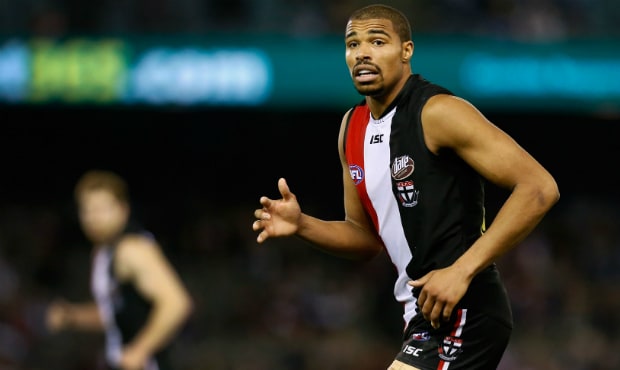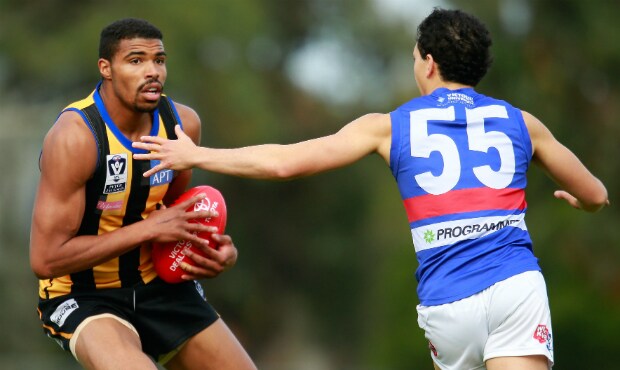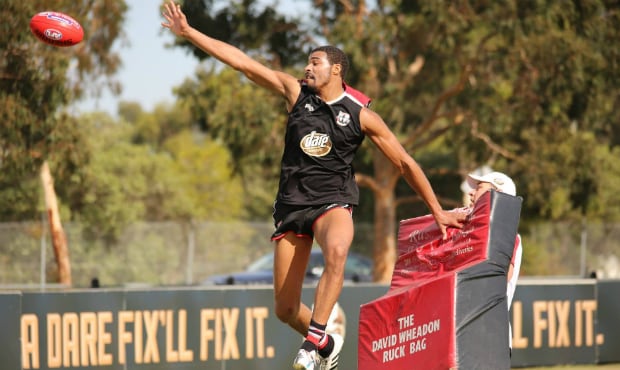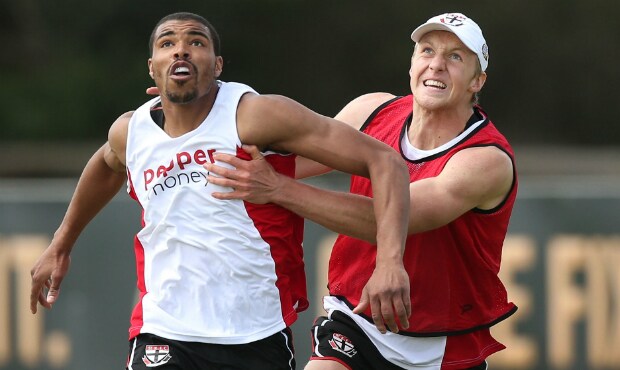Up close the modern AFL footballer is a far different physical specimen than his predecessors of the last few decades, far more sinewy and slight. On account of his finely-calibrated diet and training regime and the relentless pursuit of success, he’s closer in shape to a middle distance runner than a wide receiver, as was once the case.
This is a good thing, in many respects. The AFL footballer is now faster, stronger and more physically resourceful than ever and generally more skilled too, concepts not lost on St Kilda ruckman Jason Holmes when he emerged from almost total obscurity in 2015 to become the first born and bred American to play in the AFL. It was a truly remarkable achievement for a college basketballer who’d never properly watched a full game, let alone played in one, before the Saints secured him as an international rookie.
That debut might have happened sooner, in actual fact. Holmes had been on the verge of selection late in 2014, which is scarcely believable when you consider the increased physical toll of his new vocation and its myriad tactical complexities or take in his spindly 6’6” frame up close, as I do when he walks out of a team meeting at St Kilda’s Seaford training base, head and shoulders taller than many team-mates.
In round 21 this year Holmes reached a summit in both a figurative and literal sense, joining the ranks of elite Australian rules footballers and from the first moments of his debut against Geelong, soaring high over the top of opponents to dish out 34 hit-outs in a heart-stopping draw. He played the final two games of the season too, more than whetting his appetite for bigger and better things in coming years.
Holmes grew up in Oak Hill, Chicago. His parents met while his father Kevin played college basketball at De Paul before being drafted by the NBA’s Philadelphia 76ers. That didn’t work out so Holmes Sr adapted, setting off on a 12-year career in Europe before coming home to coach. Jason’s younger brother Mark now plays professional basketball for Chateauroux in France. The oldest of the three boys, Andre, whom Jason calls Dre, plays in the NFL for the Oakland Raiders, something that neither he nor his high-achieving father expected when the boys were young. Their two sisters are too young to have turned professional in any sport yet but you couldn’t entirely rule it out.

When he sits down to chat with Guardian Australia, Holmes says that basketball, at which he excelled in college, wasn’t even his strongest sport as a teenager. “I wanted to play baseball,” he says. But back then the bespectacled Holmes hadn’t yet realised what a difference contact lenses could make. “I always think back, ‘oh jeez, if I’d have worn my contacts, I would have hit my spots as a pitcher,” he laughs. “Being a 6’6” lefty, I just would have hit my spots and I probably could have got a scholarship for baseball. I didn’t wear my contacts and this is where I am today.”
Where he is today is still in the ranks of professional sport and it’s an environment in which he fits in well. With an athlete father, the path to this life always seemed attainable to the Holmes boys and when their chances have come they’ve taken them. “We just knew it was something we were going to do,” says Holmes. “It definitely seemed more natural.”
Even so, his life in junior sport wasn’t without its pressures. Having a former pro as a father put a target on the backs of him and his brothers. “Even as kids, [other] kids look forward to beating you, I guess,” he says. “I wasn’t the greatest basketball player. I was good enough but there was always a lot of joy if our team lost. Even the shame... you perceive the pressure yourself and you feel like you’ve let yourself and your family down. It’s good practice for when you do play professionally.”
At college his preference was to study psychology but his school didn’t offer it and suggested he pursue social work instead. This provided a sharp learning curve for Holmes. At 18 years of age he says he wasn’t ready for the demands. “You realise you’re trying to work out your own life,” he says. “How can I fix other people’s lives as well if I don’t even know what I’m trying to do or who I am or where I’m going? So I just couldn’t do it.”
To get where he is today – one of the more unlikely AFL careers imaginable – Holmes had to make a tough choice once his college years wound up, between pursuing professional basketball opportunities in Europe or taking seriously the email he’d received inviting him to an AFL draft combine in Los Angeles. “This option [AFL] came up as one and I thought there was no reason to throw it away, so let’s go to LA and try out,” says Holmes. “The opportunity to be something different was pretty exciting. Because everyone’s doing it [basketball], it’s hard to find a club that’s going to be a good career. You might as well be in college again not getting paid at some levels in Europe. It was tough.”

A self-described “hustle player” in his basketball days, Holmes impressed at the combine and soon received an invitation to try out with the Sydney Swans academy, after which crunch time came for a big life decision. “Do I want to play basketball or footy?” Holmes was asking himself. “Do I want to give up everything I know to try something different or just play it safe?’ I had to make that decision before the combine in October, which was about a two-month window.
“I think on the surface I wanted to make the easy decision but a friend pointed it out to me one night and he’s like, ‘if this is bothering you so much, the decision, you know what you want to do deep down inside, like deep down at the source you know what you want to do. If you don’t want any regrets you know what move to take,’ and that move was to play footy.”
Holmes says he puts his heart and soul into one thing at a time and that only when the time comes will he make an adjustment. “I’m putting all my eggs in one basket,” he says of his current adventure. “I’ll just put all my eggs in that basket and when time’s up I’ll just run over and take ‘em out.”
To start with, it was not Holmes but his father who was actually au fait with the game and knew its rules, complexities and physical demands. He’d been fascinated by the game after watching it on ESPN in the 1980s, even trying to introduce it to his young sons at one point but it didn’t grab them. “I didn’t remember it until after the fact,” says Holmes. “I didn’t know it was even possible for us to play the game one day.”
As for Jason Holmes’s own AFL adventure, Kevin Holmes warned his son; the road he was taking would be tough. He wondered whether Jason could handle the battering he’d receive, but Holmes only lacked for confidence in one respect: a year on from major surgery, a knee injury was playing on his mind. Even now, as he talks, he impulsively rubs, fiddles with and stretches it. “I’m still trying to find my confidence and my physicality,” Holmes says.

Back home, they still don’t quite realise what a remarkable thing he is doing but it just surprises Holmes more than anything. “What’s amazing is that in today’s day and age, where the internet keeps us connected, is that something as passionate and important as footy is so foreign and not even on the radar in the states,” he says. “This is a sport that is amazing. I mean, it combines everything you’d want to see in an athlete and we’re probably the most athletic players in the world, all the things that we’re able to physically put up with and to do. It’s just amazing that no-one really knows yet. Hopefully the sport grows into something that can become very global.”
To St Kilda, Holmes’s raw physical attributes were clear to see but it has been his attention to detail, his constant quest for personal improvement and pursuit of the team ethic that has impressed most. It’s also what has set him apart from the hordes of project players who’ve promised much and failed to crack a senior game. “I think it’d just be the ability to learn and the love to learn,” Holmes explains. “I’m always trying to improve myself in life in general and I think just the challenge of trying something new, you just have to understand that you don’t know anything about it but you just try and learn as much about it as you can day by day.”
Holmes doesn’t take it one week at a time but compartmentalises things even further, taking it one task at a time. “What are we working on today?” is the refrain, or “what’s the best way I can help the team win? If that’s going pretty well, what else can I add to make the team win? I think you just have to have an aptitude to learn and to make adjustments and to get out of you comfort zone is actually the more important thing, because you’re going to look stupid out there.”
In that debut game against Geelong, Holmes looked far from stupid, setting the game alight by leaping high over opponents and using his physical gifts to maximum advantage. His spring-heeled leap was clear to see, but equally impressive were his follow-up efforts and attack on the contest.
In person, what resonates most about Holmes is how quickly he’s assessed his surroundings and made sense of the new world around him. The path of the AFL rookie is a demanding one – base wages, hard yards and a constant quest to prove oneself worthy of both that spot and potentially an upgrade to the full list – and certainly not for the faint of heart, but Holmes is full of admiration for those who rise to the top.

“Most AFL footballers, as you see when you pull into the parking lot, drive the same cars that everyone else does,” he says. “It’s a hard job and a demanding job, but every player is deserving of every penny they make because it is that tough. Not everyone is making heaps of cash. As far as being a rookie goes, you just learn about it the first few times you go out to brekkie with the boys. You just start to learn that your budget’s a little bit different to their budget but it’s not difficult. I went to college with no money so it’s just trying to save wherever you can I guess.”
His perceptions of Australia and the surprises that moving here has entailed also reach well beyond the standard coffee, weather and beaches. The most pronounced philosophical difference, Holmes says, is his adopted country’s gun restrictions. “As a whole it’s amazing how probably micro-managed one country can be to another,” he says. “I think [in Australia] there’s more ownership to be a good citizen to your country-mates. You actually have to get used to it, but in the end it’s definitely a safer place to live and to be.”
Holmes doesn’t have any lofty expectations for his 2016 season and hopes just to perform his role if and when required, and to keep improving. “I don’t put any timeframes or numbers on it because people can really get frustrated and down on themselves if it doesn’t happen,” he says. “I tell myself to just be ready when the team needs me.”
I ask Holmes whether he feels more confident in his direction in life than the 18-year-old who felt daunted by other people’s problems. “Yeah, I could probably put a better five-year plan together now than I could three or four years ago,” he says. “I probably would have had a two-year plan at the time but that’s worked out pretty well so it’s just trying to keep moving on.”
With that I’m given one final insight into Holmes’s dedication to life as an AFL footballer. Twenty-five minutes earlier he walked straight from a team meeting to chat. Now it’s 1:54pm as he rubs his knee again and checks his phone for the time. Holmes has an appointment with the club physiotherapist, not at 2pm but at 1:55pm. In this micro-managed environment every minute counts. He won’t be late. It probably won’t hurt the team if he isn’t bang on time for his appointment, but it clearly matters to Jason Holmes.


